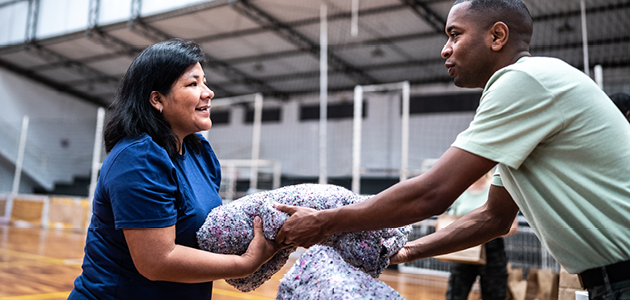March is Red Cross Month in Canada and the US. During this celebration, we honor the everyday people who give back to those in need and recognize their selfless actions. It’s been this way since it was first proclaimed in 1943 by President Franklin D. Roosevelt.1
To join in on the celebrations, we’re looking at the origins of the Red Cross and the ways you can make an impact this month.
What is the Red Cross?
The Red Cross was founded by Swiss businessman Henry Dunant in the early 1860s after he witnessed the aftermath of a battle during the Franco-Austrian War in Sardinia, Italy.2 After his experiences in Italy, Dunant wrote a book in 1862 advocating for more national relief efforts and organizations to help people in need during wartime.2 This would be the first step in the formation of the Red Cross we know today.
In 1919, the International Federation of Red Cross and Red Crescent Societies (IFRC) was founded. This international organization supports Red Cross and Red Crescent activity globally.3 The IFRC expanded the efforts of the Red Cross to go beyond just wartime and help bring humanitarian efforts to more communities during times of peace.
Celebrate the month by giving back
The best way to celebrate Red Cross Month is to give back! What better way to amplify the efforts of the Red Cross than to join in on making a difference in the lives of people and communities around you?
Volunteering your time
If you want to dedicate some of your time to helping others, there are plenty of options for you no matter where you live. Start by finding causes you care about and seeing what skills and knowledge you can offer.
Not sure where to start looking? Some of the most common places to volunteer are:
- Homeless shelters – These shelters always have positions open for people to help serve food or even just to be there and talk with the people using the facility.
- Animal shelters – Do you love dogs, cats and other pets? Animal shelters could be your perfect volunteer option. You could tackle administrative tasks, walk dogs or help with grooming.
- Retirement homes – Unfortunately, people in retirement homes can often feel forgotten or lonely. You can change that as a volunteer. You can help by organizing game nights and social events, conducting one-on-one social visits, teaching arts and crafts classes or providing musical entertainment.
- Libraries – If you’re an avid reader and love being around books, why not volunteer at your local library? Libraries often need people to help with bookshelf organization or lead reading classes and events for children who visit.
You can also volunteer directly with the Red Cross if you want to get more involved with the organization as you celebrate Red Cross Month! Branches in Canada, the US and the UK are always looking for new volunteers and can even help you find a role that suits you best.
Donating goods
Similar to volunteering your time, when it comes to donating goods, it’s all about finding a need in your community.
- Food drives – Everyone deserves access to food and when you donate to a food drive, you’re actively helping feed more people in your community. You can often find food donation bins at local grocery stores if you’re looking for a quick and easy way to donate some non-perishable foods.
- Clothing donations – You probably have some older clothes that don’t fit you anymore sitting in your closet. Or you may have clothing that no longer fits your children and baby clothes that take up space in your home. You can give old clothes a new life by donating them! Your community may have not-for-profit organizations that will gladly take old clothing and pass them on to needy kids, teens and adults.
Rolling up your sleeve
Giving blood can make a huge impact on the lives of other people. Your donation can help people like cancer patients, victims of accidents and people who need organ transplants. Regular blood donations can also benefit your health by lowering blood pressure and the overall risk of heart disease.4
Here are some tips to help with your blood donation:
- Get a good night’s rest the night before
- Avoid fatty foods and stay hydrated before you donate
- After your donation, drink extra fluids, avoid physical activities and lie down if you feel lightheaded
Disaster relief and recovery
The Red Cross has always been there when disaster strikes, working with first responders, public officials and volunteers to help provide relief across the globe. You can help make a difference in the lives of people affected by natural disasters in a few ways.
- Donating supplies – when a natural disaster occurs, people often need essentials like water, clothing, blankets, temporary shelter supplies, toiletries and over-the-counter medicines. You can create relief kits filled with a number of these essentials and donate them instead of picking a few individual items.
- Getting trained in life-saving skills – Red Cross offers plenty of training and certifications for first aid and CPR, psychological first aid, lifeguarding, basic and advanced life support and more.
If you are interested in training and certifications offered by the Red Cross, use these links:
- Canadian Red Cross Training and Certifications
- American Red Cross Training and Certifications
- British Red Cross Training and Certifications
Use your member benefits to help give back
If you are feeling inspired to give back during Red Cross Month, why not use a Foresters grant?
For a quick and easy way to make an impact, the Foresters Care™ grant is your best option. It’s a $200 grant that you can use to donate food, clothes, care kits and more to people in your community. There’s no need to organize an event or coordinate groups of people when you give back with a Care grant, it’s a small way to make a big difference.
Community Volunteer grants empower you to lead or attend meaningful activities that help out your community. You get up to $2,000 to contribute to or start one-day volunteer activities like cooking meals to help fight hunger, replenishing libraries and organizing first-aid drives.
For more information on these amazingly impactful benefits visit MyForesters.com now!
Sources
1 https://www.redcross.org/about-us/red-cross-month.html
2 https://www.history.com/topics/19th-century/red-cross#section_1
3 https://www.ifrc.org/who-we-are/about-ifrc/our-history-and-archives
4 https://www.cuimc.columbia.edu/news/surprising-benefits-donating-blood
421589 CAN/US/ (03/23)


